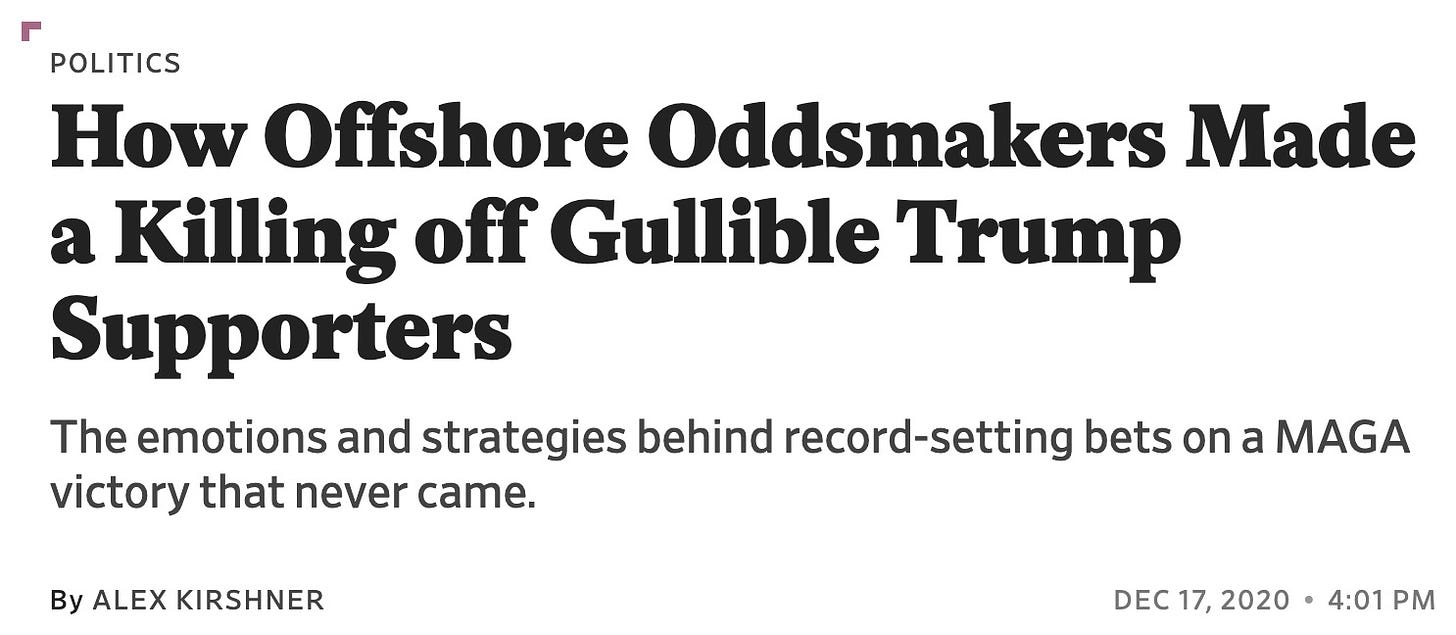
MAGA Marks and the Future of Democracy
How do you run a functional democracy when 40 percent of the people are willing suckers?
1. Suckers
I know it’s a little early, but I got you something for Christmas. It’s right here. Enjoy.
That’s right. Just give Reggie and Ashley $40 and you can board their bus at 7:30 a.m. on January 20 to go to President Trump’s second inauguration! But you better act soon, because while the early-bird price is $40 per ticket, after December 26 the cost goes up to $50.
Also, there’s this, from the Eventbrite sales page:
I’m not sure which is funnier: “No Refunds” or “Chaperone Not Included.”
But wait. There’s more.
This Slate piece last week basically broke me:
Sample amazing:
If you were cursed enough to be following betting markets on election night, those numbers might have hit you like the New York Times’ 2016 needle on megasteroids. Political analysts had warned that delays in counting mail-in ballots could create a “red mirage,” where Republicans would look good based on the Election Day vote before Democrats made up ground. But the betting odds were not buying that theory of the race. They moved hard toward Trump when it became clear he would win Florida and looked good in North Carolina, Ohio, and Texas.
The betting markets were not good predictors, but they weren’t trying to be. The online bookmakers that fielded bets on the election saw their largest single-event windfall ever. To understand why, you need to understand election betting and Donald Trump supporters.
It gets better:
“Everybody knows that the Super Bowl is the biggest bet event of the year by far, and this doubled the last two combined,” Mason says. . . .
The odds-shifting bonanza on election night, with all that money on the line, was not a sign that the oddsmakers knew something the mainstream media did not. Instead, the Trump spike was the peak of a phenomenon that had been unfolding all year. Many Trump supporters were certain he could not lose, and they plowed so much money into betting on him that they distorted markets in his (and ultimately, the sportsbooks’) favor.
“It’s the most irrational market I ever saw,” says Collin Sherwin, a Tampa, Florida–based gambling writer who covers the industry for Vox Media’s DraftKings Nation. . . .
Trump’s odds were miles ahead of what election number crunchers suggested they should be. At the beginning of June, the betting odds said a Biden win was slightly likelier than a coin flip. At the same time, FiveThirtyEight’s polls-based model had Biden around 70 percent to win. (Nate Silver repeatedly noted this discrepancy and said in August that betting markets had become “so dumb as to perhaps be a contrarian indicator at this point.”) . . .
Throughout the year at Bovada, Morrow says, the money coming in was around 2-to-1 for Trump. At BetOnline, around 60 percent of bettors were on Trump, though the total money was closer to 50-50, meaning Biden backers placed some large bets.
For most of the year, Trump’s short odds to win (requiring bettors to risk more money for smaller winnings) were not a reflection of inside political knowledge, or of the oddsmakers being MAGA guys. Bookmakers were taking on so many Trump bets that they consistently tried to discourage people from betting on him.
“The Trump guys were just out in full force,” Mason says.
But the craziest part is this:
Late that night, Fox News called Arizona for Biden, and Nevada started looking good for him, too. Overnight, new batches of mail ballots made Biden the clear favorite in Wisconsin and Michigan and suggested he was on a good pace in Pennsylvania. By the morning, Biden was a heavy favorite all over the market. And by 2:30 p.m. Eastern on Thursday, two days after the vote, Biden was -1100 and Trump was +575 at Bovada.
Through it all, Morrow said a huge majority of the money bet at his site remained on Trump—including “3- or 4-to-1” on Trump after the election.
You may recall that I had a little piece of the action myself. A few weeks before the election some guy was spouting off and insulting me on Twitter for saying that Biden was the overwhelming favorite and that even if the polls were off by more than 2016, Biden was a near certainty to win.
I offered a wager. He accepted. I asked where he wanted to put the money in escrow. He assured me this was unnecessary and that, on the off chance Donald Trump did not win in a landslide, he’d be happy to pay me.
I took his word for it, because he’s a Catholic priest.
TL;DR—he never paid because, as he told me, the election was stolen.
Normally this is the part where I insist that I’m not doing this to dunk on these poor marks. But like Kayleigh McEnany, I made a promise. I will never lie to you. So, yes. This is what I’m doing.
But I have a point, too: None of this is rational. This is the monetary equivalent of Eric Metaxas saying that it doesn’t matter what he can “prove” because he just knows that Trump won.
How do you argue with that? You can’t.
And when people stop being rational actors who respond to normal incentives, then things get dangerous.
By any reasonable metric, Donald Trump’s job approval rating right now should be far below what it was in 2018. We have over 315,000 dead Americans. Millions are jobless. We are in the middle of the worst cyber attack in American history. Trump lost the election and has continued to embarrass himself and his supporters for six weeks. And yet . . .
Trump’s job approval today: 44.8 percent. Trump’s job approval in December of 2018, when Americans were fat and happy and alive: 43.6 percent.
It’s ticked up over the last two years.
Put this all together and you have only two possible explanations:
(1) Trump supporters are irrational, which makes them wholly unresponsive to incentives—mass death, losing their jobs, losing bets about Trump.
(2) Trump supporters are rational, but their incentives are non-traditional. Which is to say, the benefits for them are more psychological than material, and are tied less to what happens in the real world than to the things Trump says. Such as insisting that he won the election in a landslide, that he wants the results overturned, etc.
I don’t know which of these is correct. But I also don’t really think it matters. Because either way it means that we have a large bloc of voters in this country who—for whatever reason—behave in ways which are antithetical to democracy and liberalism.
2. DEFCON: What Level You Got?
I think we’ve safely moved out of the zone where there was a small, but non-zero, chance that Donald Trump would successfully overturn the election by extra-legal means.
So in that sense, down to DEFCON 5.
But if the DEFCON scale is only a question of “Has the republic fallen?” then it’s not particularly useful and the scale should just be a binary.
Has the Army taken control of the government? If not, then we’re cool. Nothing to see here.
So if you set the bar a little lower and are willing to stipulate that events which are Not the Literal End of American Democracy can still be really bad, then . . .
Well, things are really bad.
Over the weekend the president of the United States welcomed into the White House Sidney Powell and Michael Flynn to discuss his strategy going forward.
Powell is the Crazy Kraken Lady.
Flynn is the recently pardoned retired general demanding that the president declare martial law, convene “military tribunals,” throw out the 2020 results, and re-do the election.
In short: Michael Flynn is way far out over the sedition line.
And the president of the United States summoned him to the People’s House to ask his counsel.
It does not matter what was said at this meeting. If Trump wants to say they didn’t discuss the imposition of martial law, fine.
Because the very fact of this meeting is an assault on democracy.
We have reached the point where the only defense that can be made for the president is that he is either not serious about, or capable of, carrying out the overthrow of our democratic system.
Do you understand what it means once you lower the bar for acceptable behavior to that level? Where the citizenry is supposed to take as normal and acceptable that a president can desire and promote the overthrow of our democracy?
It means that the “unthinkable” has become very much thinkable. And if there is no price to be paid for those who think it? Well, then.
As Mr. Cobb says, “Once an idea has taken hold of the brain it's almost impossible to eradicate. An idea that is fully formed, fully understood? That sticks. Right in there, somewhere.”
Here’s another idea: People should say what they really think. You don’t automatically crack back on someone just because they’re on the other “team” and you don’t look the other way on the bad behavior of people on your own “side.” You call it like you see it.
That’s what we do here.
3. Life Choices
No judgments. But this is one of the weirdest stories I’ve read since forever:
Almost every weekday for six years, Christie Smythe took the F train from Park Slope downtown to her desk at Brooklyn’s federal court, in a pressroom hidden on the far side of a snack bar. Smythe, who covered white-collar crime for Bloomberg News, wore mostly black and gray, and usually skipped makeup. She and her husband, who worked in finance, spent their free time cooking, walking Smythe’s rescue dog, and going on literary pub crawls. “We had the perfect little Brooklyn life,” Smythe says.
Then she chucked it all.
Over the course of nine months, beginning in July 2018, Smythe quit her job, moved out of the apartment, and divorced her husband. What could cause the sensible Smythe to turn her life upside down? She fell in love with a defendant whose case she not only covered, but broke the news of his arrest. It was a scoop that ignited the Internet, because her love interest, now life partner, is not just any defendant, but Martin Shkreli: the so-called “Pharma Bro” and online provocateur, who increased the price of a lifesaving drug by 5,000 percent overnight and made headlines for buying a one-off Wu-Tang Clan album for a reported $2 million. Shkreli, convicted of fraud in 2017, is now serving seven years in prison.
“I fell down the rabbit hole,” Smythe tells me, sitting in her bright basement apartment in Harlem, speaking publicly about her romance with Shkreli for the first time. The relationship has made her completely rethink her earlier work covering the courts, and as she looks back on all of the little decisions she made that caused this giant break in her life, she says she has no regrets: “I’m happy here. I feel like I have purpose.”
Wut?

















